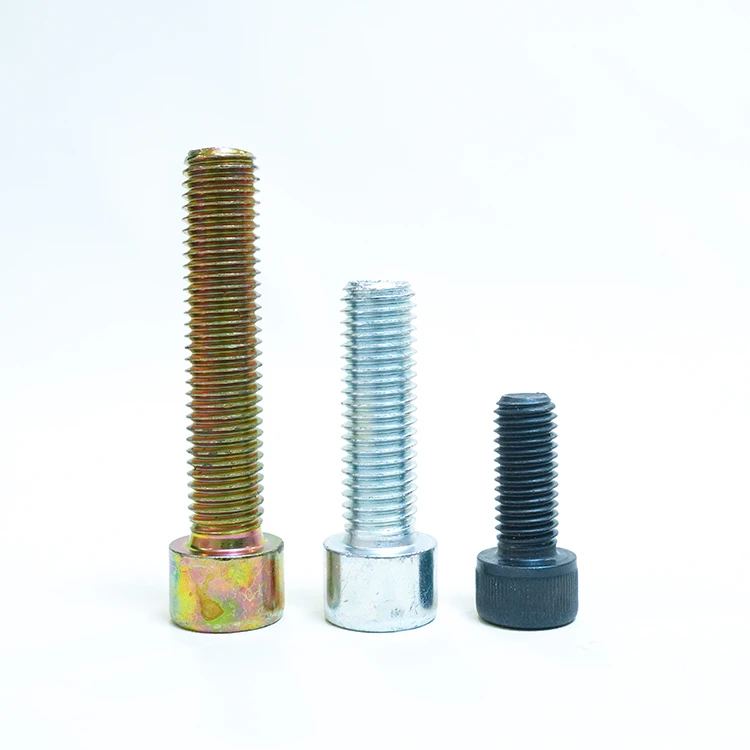Introduction
DIN 7380 and DIN 7991 round head hexagon socket bolts are essential fasteners used in various industrial applications. These bolts are known for their robust construction, versatility, and ability to provide secure fastening solutions in both structural and aesthetic applications. This article explores the unique features, benefits, and typical uses of these bolts.

Design and Specifications
DIN 7380 Bolts
DIN 7380 bolts, also known as button head hexagon socket bolts, feature a rounded head with a hexagonal socket. The rounded head provides a smooth, low-profile finish, while the hex socket allows for easy installation using an Allen wrench or hex key. These bolts are typically made from high-strength materials such as stainless steel, carbon steel, and alloy steel, ensuring durability and resistance to corrosion.
DIN 7991 Bolts
DIN 7991 bolts, or flat countersunk head hexagon socket bolts, are designed with a flat head that sits flush with the surface when installed. The hexagonal socket allows for precise torque application, making these bolts ideal for applications where a smooth, unobtrusive finish is required. Like DIN 7380 bolts, they are also manufactured from high-quality materials to withstand demanding conditions.
Material and Finish
Both DIN 7380 and DIN 7991 bolts are available in various materials, including:
- Stainless Steel: Offers excellent corrosion resistance, making it suitable for use in marine and outdoor environments.
- Carbon Steel: Provides high strength and durability, commonly used in heavy-duty applications.
- Alloy Steel: Known for its high tensile strength and toughness, ideal for high-stress applications.
The bolts can also be coated with different finishes such as zinc plating, black oxide, or hot-dip galvanizing to enhance their corrosion resistance and aesthetic appeal.
Applications
Automotive Industry
In the automotive sector, DIN 7380 and DIN 7991 bolts are used extensively due to their ability to provide secure fastening in areas with limited space. The hex socket design ensures efficient tightening, preventing slippage or loosening over time. These bolts are used in assembling various components, including engine parts, chassis, and interior fittings.
Machinery and Equipment
For machinery and equipment assembly, these bolts are essential due to their high strength and ease of use. DIN 7380 bolts are often used where a rounded, smooth finish is desired, while DIN 7991 bolts are preferred for flush mounting applications, ensuring that the bolt head does not protrude and interfere with moving parts.
Construction and Infrastructure
In construction, both types of bolts are used for their reliability and strength. DIN 7991 bolts are ideal for securing structural elements where a smooth finish is required, such as in metal framing or cladding. DIN 7380 bolts are used in applications where the bolt head needs to be visible but should not create sharp edges or protrusions.
Advantages
- Enhanced Torque Application: The hex socket design allows for precise torque application, reducing the risk of over-tightening or under-tightening, which can compromise the integrity of the fastening.
- Aesthetic Appeal: The round head and flush design provide a sleek, finished look, which is beneficial in applications where the fastener is visible, contributing to the overall aesthetics of the project.
- Space Efficiency: The ability to use an Allen wrench or hex key makes these bolts ideal for applications with limited space, where traditional wrenches may not fit.
Conclusion
DIN 7380 and DIN 7991 round head hexagon socket bolts are vital components in various industries due to their unique design, material strength, and versatility. Their ability to provide secure, reliable fastening solutions makes them indispensable in applications ranging from automotive to construction. Understanding the features and benefits of these bolts enables professionals to make informed decisions, ensuring the safety, reliability, and longevity of their projects. As industries continue to advance, the demand for high-quality fasteners like DIN 7380 and DIN 7991 bolts is expected to grow, underscoring their importance in modern engineering and construction practices.
